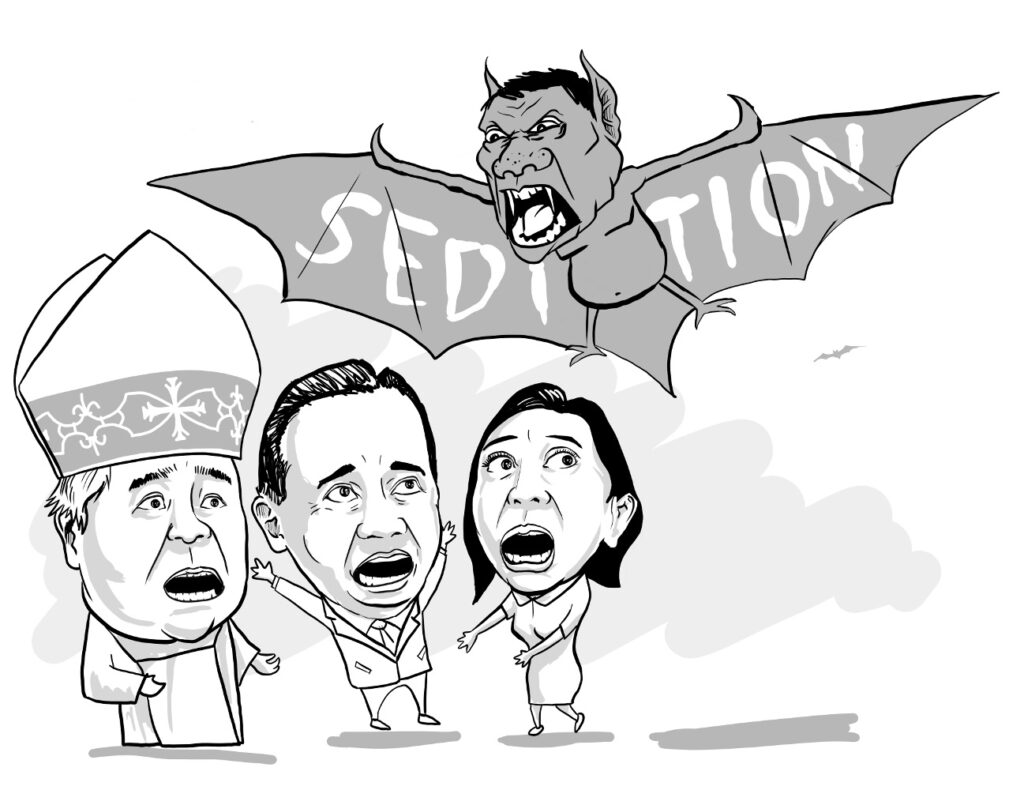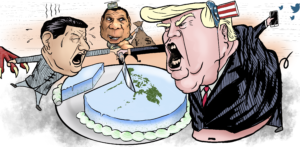Rift in the Duterte alliance widens

The rift in the Duterte-Arroyo-Marcos alliance is widening further. This is evident in the continuing rivalry among its henchmen who are vying for the highest position in Congress. Duterte directly intervened in the competition by endorsing last July 8 Alan Peter Cayetano and Lord Allan Velasco to alternately share the Speakership. But days after this, however, the congressmen still failed to reach a consensus contrary to Duterte’s expectations.
Until the eve of the opening of Congress, nobody among the rivalling congressmen is certain to garner a majority vote.
When Duterte endorsed the speakership of Cayetano and Velasco, he also endorsed Martin Romualdez from the Arroyo bloc to act as the majority leader. Cayetano gained the blessing of Duterte because he promised to lobby for charter change or cha-cha in Congress. Many, however, still oppose the plan for his speakership. The PDP-Laban, earlier, refused the term-sharing offer. Three other blocs in Congress, including that of siblings Sara and Paolo Duterte’s, are also not amenable to the scheme.
New wrapping, old scheme
Duterte’s endorsement of Cayetano was primarily based on the latter’s promise to champion cha-cha. Despite having a supermajority in the previous Congress, Duterte failed to railroad this scheme due to contentions between the Senate and Congress on certain key provisions on the transition to the federal form of goverment.
To pave the way for cha-cha, the Inter-Agency Task Force on Federalism and Constitutional Reform guised it as a new package which emphasizes on economic provisions that will purportedly “open the economy to give everybody hope.” Under this slogan, the regime will certainly push for neoliberal constitutional reforms which have long been recommended by the American Chamber of Commerce.
The Task Force is lobbying for “federalism,” but as Duterte recognized that there is no broad support for this, he instead declared “even if you don’t like federalism, you change the constitution still.” According to Eduardo Año, secretary of the Department of Interior and Local Government, the direction of cha-cha may still change in the coming three years.
Details on constitutional amendments proposed by the Task Force are yet to be publicized. But based on the Resolution of Both Houses No. 15 which wass issued on December 2018 by the Congress, it is certain that the Philippine Constitution will worsen as it contains proposals to remove provisions which protect the insterests of local businessmen and the people, and to liberalize the local economy for transnational corporations. Similarly, it gives Duterte legislative powers and absolute control of the government. In Duterte’s “new” constitution, the people’s rights will be reduced, and they will lose the right to impeach an incumbent president.
Intimidating the political opposition

Amid rivalries among his allies, Duterte is ensuring that his political enemies will neither be able to stand on their own nor earn the support of Congress and other branches of the state. On July 18, he filed a sedition case against political oppositionists, including Leni Robredo, vice president of the Philippines, and 35 others. Also among those charged were LP senators, Otso Diretso candidates (except Mar Roxas), priests and a bishop, lawyers and their supporters.
The Communist Party of the Philippines called this a “intimidation and harassment” attempt against political oppositionists which serves as his warning to those who will refuse his cha-cha agenda. “Pure hogwash,” beyond belief,” and “extreme harassment and intimidation,”—these were the reactions of the senators and bishop who were accused of inciting to sedition by the regime. The case was based on a video statement of Peter Advincula (alias Bikoy) who implicated the Duterte family in illegal drug trade. This legal attack clearly aims to harass, intimidate and coerce the opposition to stop from fighting his schemes. This also serves as a warning to Duterte’s allies who are planning to unite with the opposition. Earlier, LP declared that it was “open” to joining the supermajority to be established by Cayetano in Congress.

